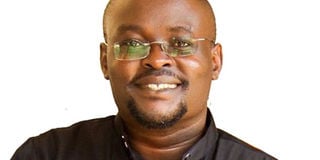Turning Uganda’s agony to relentless push for change

Mr Arthur Larok is the federation development director, ActionAid International
What you need to know:
Shared prosperity. No matter how it is presented, Uganda’s immediate crisis is how to transition from the current dispensation to a new one, which should be followed by establishing foundations for peaceful co-existence, equal opportunities and shared prosperity.
Call the leadership in Uganda what you like, but expect the situation to get worse before it gets better.
The events in Uganda over the last three weeks have left anyone who care about humanity terrified, not knowing what the future of the country will be like.
In what was considered by many a ‘do or die’ by-election for Arua Municipality, a seasoned politician, Kasiano Wadri, from the Opposition, defied all odds, including his failure to vote for himself because he was jailed, to become MP-elect of Arua Municipality. His journey to victory was given a boost by a People Power crusade led by MP Robert Kyagulanyi, aka Bobi Wine, arguably one of Uganda’s most intelligent musicians.
The People Power crusade had already delivered telling victories in two other by-elections in Buganda and Busoga.
In both these by-elections, he defeated candidates campaigned for by two of Uganda’s leading political protagonists, Dr Kizza Besigye, arguably Uganda’s most popular political leader and President Museveni, who has been in power since 1986.
Wadri’s victory, however, came at a high cost - a driver of Bobi Wine was shot dead and five MPs were incarcerated. They are now facing treason charges although they have been released on bail.
Two of them, Francis Zaake and Bobi Wine, among 31 others, were severely brutalised. But how did Uganda get to this point and what can be done to achieve our pipe-dream of peaceful co-existence, equal opportunities and shared prosperity in a country so naturally richly endowed?
Uganda’s current problems are a factor of deep seated historical fault lines, including attempting to forge a nation in a country where all but four indigenous groups are immigrants.
The environment today is a direct consequence of poor governance and failure to respect Uganda’s 1995 Constitution.
In 2005, the presidential term limits were removed, but for whose benefit? In 2017, again the Constitution was changed with the removal of presidential age limits set between 35 and 75 years in the Constitution.
Besides, all presidential elections since 1996 have been fraught with irregularities and fell short of being free, fair and credible.
No matter how it is presented, Uganda’s immediate crisis is how to transition from the current dispensation to a new one, which should be followed by establishing foundations for peaceful co-existence, equal opportunities and shared prosperity.
This is possible if we shift from agonising on social and other media to organising a national, grassroots anchored non-violent movement for leadership change and political transition.
Bobi Wine and 32 other suspects have been granted bail, but we must use their freedom as an opportunity to push for real change so that no Ugandan suffers again the indignity we see today.
To achieve this, the Opposition must unite and rise above personal egos and party logos. Civil society in its diversity must get out of their comfort zones and posturing on WhatsApp and Twitter and be part of, and/or support people’s struggles for justice and dignity.
Uganda’s donor community should at best buttress people’s struggles for justice and stop micro-managing civic struggles through obsolete log frames. At worst, they should stop using aid money to prop up a brutal regime.
Together we can reject, eject and restore our dignity as a people!
Mr Larok is the federation development director, ActionAid International
[email protected]


